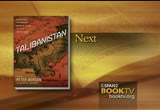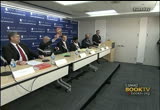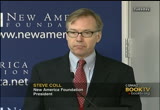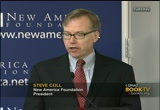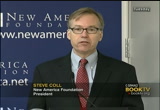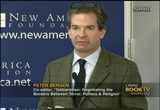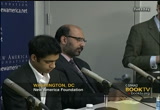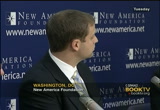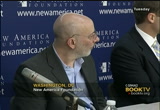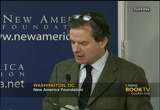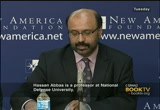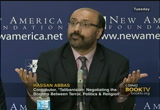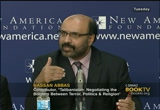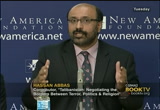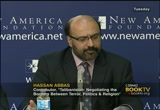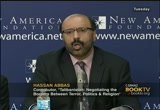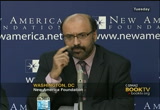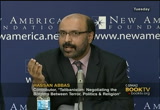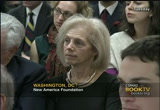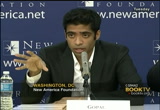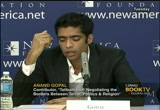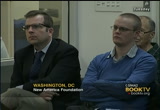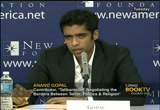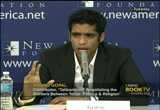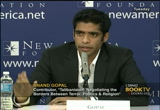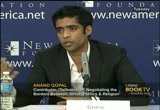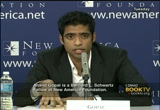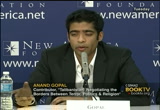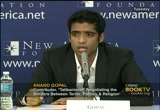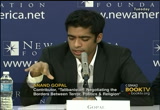tv Book TV CSPAN January 12, 2013 7:00pm-7:30pm EST
7:00 pm
7:01 pm
of the subject matter to be discussed today were the of what became a years of endeavor and peter bergen will be your host and moderator today. catherine unfortunately is not here to the -- today but is a:editor about the taliban and its environment southern afghanistan, and western pakistan. to get at them itself when the united states was puzzling over its resurgence in afghanistan as a military challenge that had been neglected in the years after
7:02 pm
the 2001 arab emirates that it presented itself as a grave dilemma to the obamacare administration so we try to provide the regularity about this phenomenon recognizing the cliche image of the of one i aid malaya and his band of fanatics was inaccurate and falsified the problem. said not to prosecute a particular view of the taliban but look at its diversity and aspects of the character fetter not part of american debate to. i am really proud of this book and peter whose leadership from new america
7:03 pm
has been a joy in my office to support him and watch him. the last thing i want to talk -- that i want to say is with the research is part of a much broader body of work that we engaged in it and hope your subscribers and readers as you are with foreign policy with conferences and publications, anyway we are pleased to have this occasion and have a discussion about the subjects that are in the book for foreign policy.
7:04 pm
[applause] >> thank you steve. you instrumental to make this project have been. also oxford university press that published the book and also to my:editor catherine and the people here at the foundation also jonathan who helped to make the book possible. the reason it was necessary storming off the stage from 1970's of the insurgent movement is important yet at the same time that is less
7:05 pm
well understood. and we had the great bull of on the taliban but we wanted to focus how did they develop after 9/11? we have one dozen chapters in the book and those on stage you contributed in those two writing a book that chapter with the taliban insurgency as it relates to the condo tarry taliban without movement to negotiate with the afghan government were not followed up. also the professor at national defence university
7:06 pm
and at columbia and that a high ranking pakistan a police official that now has the political scene when the political ecosystem that the pact is danny taliban chance when because although the m&a are sufficiently lined to allow the political space it enjoyed during the 2009 time period with denial about the pakistan the taliban and the threat that opposed. bright and fishman also works here a company with which you are familiar. he worked on two chapters was looking at the network than he is probably the only person watching who has met the defacto leader of his network.
7:07 pm
and also did a chapter where he would step back to look at the different taliban groups given the tech -- pakistan the state board a very interesting way to capture the topology. ken ballen of leading pollster in the muslim world to look at the sensitive political questions it is tricky but we had a good partner on the ground that helped us how to make this say scientific poll to explain some of those then wrote a book terrorist in
7:08 pm
love that is and is an account of the g. hardy and why they join certain groups and what he learned in the process of writing that book. ken ballen served on the staff and now a national defense university and has one negative written a chapter on the strategic defeat of both chitin and what we should do about a. it is a popular view in washington d.c. how they say attacking been gauzy is proof but we will do without question with his remarks. finally sameer lalwani a ph.d. candidate and has say an interesting chapter on
7:09 pm
counter insurgency operations that is quite effective but arguably the pakistan need military did better than we have in afghanistan that we will start with hassan abbas. >> first and foremost, figure eight work done by the new america foundation is a great contribution and source for research everywhere and not just the u.s.. i just returned from pakistan 48 hours ago. three days in pakistan and two were discussing phenomenon.
7:10 pm
we had just gone back and this was recent to hold a big rally coming up with a new agenda and in three months there is political activity but i am given seven minutes on the frontier province and given my position that today my views are my personal views but the political landscape with the frontier province, that is the guy focused on.
7:11 pm
-- what i focused on but with the tribal area with six or 7 million people but they will look at the adjacent area that the british framed it like that with 20 million people with all of the past june together. this is the connection with the mainstream and fought top. how the taliban with the genesis and establishing there roots and step-by-step that is why this area from the province is important
7:12 pm
and to the points to focus on one of the reasons why genesis or creation became it a reality was they discovered from 2002 through 2008 those political parties that believe in a democratic process and not like the groups that believe in the militancy but believe in the democratic process they have websites in this group represented thus any group and those fetter cozy to
7:13 pm
this id version so it looked like with the different religious political parties coming together. this was the first opportunity but if i may call that devastating. not looking at military or terrorism but the conservative narrow minded policies look the other way. that created the space for the new networking or connectivity between fatah and the militants. these groups were banned so they started to move from
7:14 pm
punjab to go to india then they were banned and stopped they started to move from punjab through fatah sent to pakistan. this cause them with of teetwo province to stop them because it was not through the civilian law enforcement but the agency's so that is a large failure so that was for all of the activity. it was a successful
7:15 pm
operation in military deserves credit but it says there were about 17 major tax from taliban groups, 105 different firefights. this is a contentious issue arguing some of the taliban are attacking pakistan from the other side. maybe this civilization or consolidation of peace has happened to thousand militants have one important factor. the modern history of masai salute -- unless i salute,
7:16 pm
7:17 pm
not been able to defend and if these courageous people stand up to the taliban then it creates a scary scene. i think i have finished with my a eight minutes but leave you with the idea is successful case but the process we don't know how far it can go. ordinary people of this province they had created the space. they have been with of problematic forces the
7:18 pm
without investment of education they cannot command of the crisis they are in. 768 schools with this last year and i have not seen any effort to take up these major causes for infrastructure. to set up to ensure the change. >> i will focus on the afghan taliban it is a completely different beast. my a chapter on cantar covers 2002 through 2004 as the major period.
7:19 pm
i believe that patterns of conflict were locked in by 2004. i went back to see what could be gleaned from that period? i was surprised. most of the dynamics on the ground in afghanistan and cantar are completely relevant to today. i see two key questions. first, what happens if the u.s. leads? to the taliban want to negotiate? sizing to chapter is very useful and believe it is the longest chapter? of only focus on those in the two issues.
7:20 pm
after 2001 taliban were routed left in shame and defeat and the people of afghanistan will come back. out haida fled and said -- to clear the hide and i assume it had the same position calling with the infidel in the foreign occupiers and they asked me to lew steady cantar to grapple with what was happening i came to a different conclusion than i originally thought. in short, after 2001 the taliban quipped. it quit wholesale. i mean those that constitute the insurgency had quit and
7:21 pm
tried to engineer the deal with the afghan government. i dug up a quote that the pakistan a cleric's try to drum up support and say we need to send many to fight the occupiers. but to this is from a very high-ranking person who's said we want to tell the people the taliban system is no more. they should not give any more donations. the government is established we will not launch any action against it. on one lovell is surprising that looked at afghan history over 30 years, it is really not.
7:22 pm
what you can see is a large number of factions fighting against each other driven by survival. the taliban to power in 1994 and is placed powerbrokers door war lords and gave them the option to submit to us and to surrender weapons and give up politics and you can live or we will fight. some fled and some stayed. talking to the taliban major ship many expected the same thing. so what you have specifically is the entire leadership of the taliban,
7:23 pm
foreign affairs defense, a front-line commanders advisers for the supreme leader cut deals with the afghan government in which you guys. even the most ideological people one example is with the ministry of justice, one ideologue for the most draconian social policies wielding religious police even he surrendered to cut a deal with the afghan government. including thousands of foot soldiers. there is an opening there for broad political settlement but it did not come to pass.
7:24 pm
this is why it is relevant today. today it is whether settlement is in the cards. but what the taliban leadership found is instead every single deal engineered was overturned. someone mentioned one of the ideologue's of draconian is some. he turned himself then to the kandahar province invaded deal through tribal intermediaries. the terms were he would give up rights to political life and would then retire to the whole village gm publicly pledged support and would
7:25 pm
agree to be monitored from the afghan government. he retired to a life of preaching. news of this came to roosevelt and he was furious with the archives and what people said about this. they said we were making deals with terrorist so pressure was placed on candlepower so the people said we are under a lot of pressure and we cannot guarantee your safety here in afghanistan. so he fled to pakistan. this case was played out again and again another
7:26 pm
example that was very pertinent former interior minister under the taliban also a provincial governor also a triumph of cars i. after 2001 he had repudiated the taliban in seeking a way to doing the afghan government. he contacted his brother to a range a deal if he could join the government. the meeting was scheduled to take place on the border but they caught wind of this and were not too pleased with the idea of the taliban joining the car's side government. they told americans and i
7:27 pm
believe they arrested them and handed him over to the americans and he is still and guantanamo today. a lot of the talks and negotiations taking place and are about prison releases that the taliban seek to release. you can go across the board. the chapter goes into more detail we also have night raids and the afghan government and human rights abuses not just words taliban numbers but people who the afghan government or the americans perceived as
7:28 pm
being space with the taliban in which they had driven recruits from. for those who were once in the taliban in communities that the taliban was drawn because there was no room in the political system for them. and the taliban was reconstituted. what is striking to me is how relevant that seems today.
7:29 pm
so my sense is broadly speaking those that are mostly political that i mean not front-line commanders rather former ministers of education, religious ideologues people in the inner circle recognize where her desperately tried to reconcile that the taliban will not win the war. to me it is clear. they recognize that. they have this orientation there are those with the taliban leadership.
102 Views
IN COLLECTIONS
CSPAN2 Television Archive
Television Archive  Television Archive News Search Service
Television Archive News Search Service 
Uploaded by TV Archive on

 Live Music Archive
Live Music Archive Librivox Free Audio
Librivox Free Audio Metropolitan Museum
Metropolitan Museum Cleveland Museum of Art
Cleveland Museum of Art Internet Arcade
Internet Arcade Console Living Room
Console Living Room Books to Borrow
Books to Borrow Open Library
Open Library TV News
TV News Understanding 9/11
Understanding 9/11